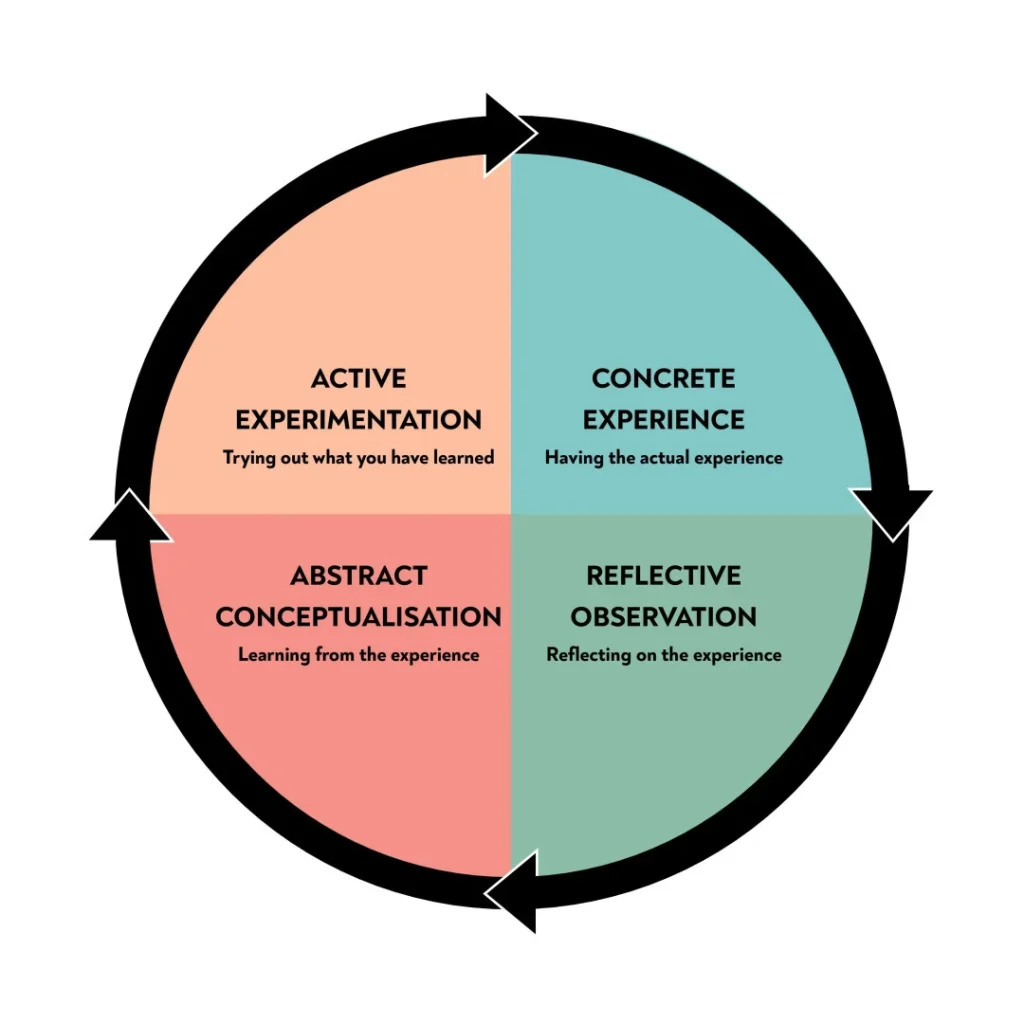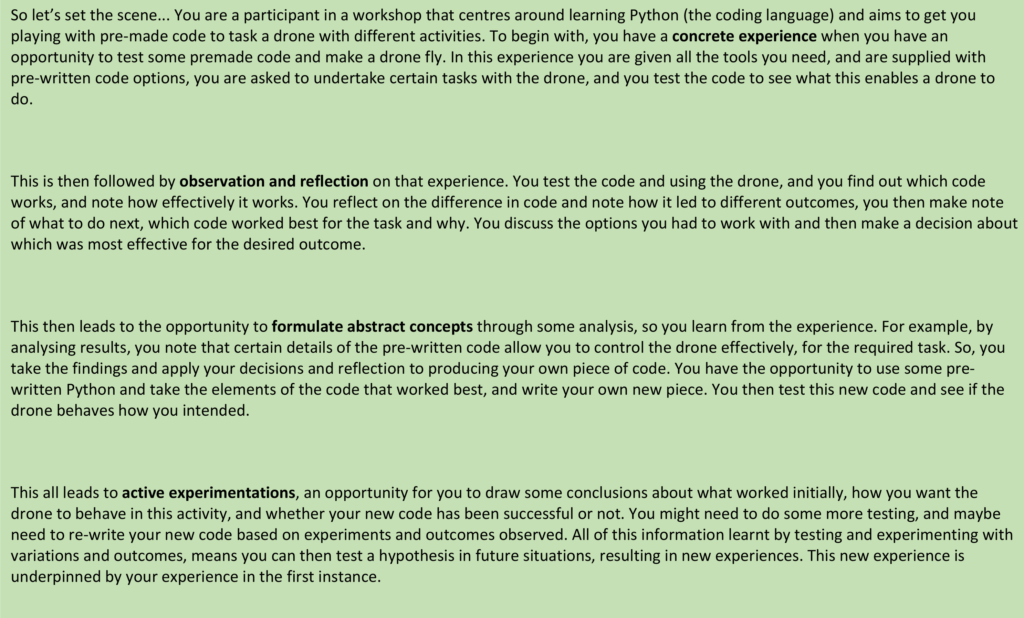We are going to give you a couple of options to start your search on theoretical underpinning to your facilitation practice, you can decide what is right for you and what feels like a fit. As you research these theories, consider your own learning experiences where you have felt truly engaged and where you really learnt something, why was this? What style did the facilitator have, do you recognise any key indicators that match this theory? What do you want to know more of?
Constructivism
If you have facilitated a session before, or attended a sessions or lesson, there is a good chance that you have witnessed or used constructivism. But did you know you were using it, did you notice you were experiencing it, and are you aware of why and how it works?
The term refers to the idea that we construct knowledge for ourselves, that there is an active and individual process taking place. Although this process of learning might be supported by group or collaborative exploration, the individual experience is very important in this theoretical view. The theory suggests each learner will both individually and socially construct meaning around ideas or presented information, and builds off of what they already know as they learn, test and develop new meaning. Constructing meaning attached to existing experience or knowledge is learning.

Read: Constructivist Learning Theory: The Museum and the Needs of People
CECA (International Committee of Museum Educators) Conference, Jerusalem Israel, 15-22 October 1991, Prof. George E. Hein, Lesley College. Massachusetts USA
Read an article exploring this theory here, this article makes reference to application within museum learning, which is often an active and engaging model…interesting?
- Make a note of the most important principles for learning, and the key points made
- Make note of how you feel this relate to your developing facilitation style/practice – why/how/why not?

Watch: Education Reimagined Through Constructivism | Michelle Thompson | TEDxBethanyGlobalUniversity
Watch the Ted X talk below and begin your own workbook using the reflective task below.

Note:
Some key thinkers, theorists and practitioners in this field are Dewey, Piaget and Vigotsky (among others). Do some research about these people?

Stop and Reflect:
Reflect on your experiences of Constructivism
There is no ‘right or wrong’ way to do this, except to be precise: While considering learning environments or workshop sessions that you have attended, make note and reflect on situations you feel exemplified a constructivist approach or method.
- Take note of the session, the aims and objectives you were led through and what you did
- Consider and note down the key aspects you feel exemplify a constructivist approach
- Think about the relationship between the session aims and shared information, and how you developed your own meaning or constructed your own ideas to exemplify learning.
- Be specific about what you learnt, and why you think that learning took place
- How do you feel about this theory or the experience…

Watch: What is…Active Learning?
Watch this short video about encouraging active learning in sessions.

Stop and Reflect:
Can you spot any similarities between active learning and constructivism?
Make a note on this, and begin your own research into the 2 theories introduced so far. Note down what you find and continue to explore the overlap. Consider how to draw your findings into the realm of ‘facilitation’, try not to get too caught up with classroom or teacher/student based examples…
Kolb’s Learning Styles and Experiential Learning Cycle
David Kolb’s experiential learning theory works on two levels: a four-stage cycle of learning and four separate learning styles. This section will focus on the cycle, and introduce the idea that learning through experiences that you can then build understanding from, is essential.
So, learning that is centred in experience, and connects the development of knowledge to multiple different approaches where the learner can test and explore their acquisition of knowledge, is deep learning. Workshops and sessions underpinned by this theory would see participants experiencing new information/scenarios, reflecting on the developed knowledge and questioning this, then putting into action what they have learnt and then applying new ideas to the world.
The key to experiential learning theory is that engaging individuals in experiences alone is not sufficient to teach them something; you need to also provide time for them to process those experiences, connect them to conceptual understandings, and apply them in new ways.
Kolb’s (1984) Model of Experiential Learning: Kolb (1984) theory of experiential learning discusses the key components of learning-by-doing, how it works and the characteristics which contribute to meaningful practice. As a widely-accepted theory, educators can use incorporate the model to support teaching practice and learner experience. The model is known for its holistic approach to student learning, which incorporates action/reflection and experience/abstraction.

Kolb’s learning cycle, a diagram of the following outline (found at https://www.simplypsychology.org/learning-kolb.html)
Concrete Experience – the learner encounters a concrete experience. This might be a new experience or situation, or a reinterpretation of existing experience in the light of new concepts.
Reflective Observation of the New Experience – the learner reflects on the new experience in the light of their existing knowledge. Of particular importance are any inconsistencies between experience and understanding.
Abstract Conceptualisation – reflection gives rise to a new idea, or a modification of an existing abstract concept (the person has learned from their experience).
Active Experimentation – the newly created or modified concepts give rise to experimentation. The learner applies their idea(s) to the world around them to see what happens.

See Also: Institute for Experiential Learning overview
Take a look at this in depth exploration and look at those styles – does that give you any ideas for your session? What styles will you utilise or develop from?
What might this look like in a workshop?
Effective learning emerges when a person progresses through the experiential learning cycle.

Problem Based Learning (PBL)
Problem-Based Learning (PBL) is an active method of facilitating learning. It utilises hands-on and active learning scenarios and ‘problems’ that are centred on the investigation and (potenitally) the resolution of messy, complex, and sometimes real-world problems. By starting with a problem to frame the exploration, learners are given a context in which to work, a really clear aim and an opportunity to develop innovative ideas and responses that could be situated in the world.

Watch: What is Problem-Based Learning?
Try to ignore the focus on ‘school’, ‘kids’, and ‘student’ in this video, and apply the theory and perspective onto your own workshop ideas. Think about how problem setting, designing the aim or plan for a workshop, and setting parameters, might actually be designed by your participants, in the session! How about that…?

See Also: IDEO
Take a look at IDEO, an offshoot from the Stanford university D School project. Think about how problem based enquiry can lead to innovative and unexpected learning, outcomes and could even begin to solve the BIG & the small issues in the world. If you want to enact change through your facilitation, consider the use of the D School Library and how Design Thinking could support your facilitation development.

Apply Your Thinking:
Time to apply your learning to your own session plan:
At this stage of the Self Study Pack, you have built a toolkit from advice and resources, and have now begun to apply your learning to your own idea, and session plan. Wherever you are at with you plan, we would like you to now start to embed some theory to your planning. Consider your approach, your tutor voice, what you aim to share with your ideas, and begin to apply a learning theory to your toolkit.

Important!:
Just because you research a certain learning theory, does not mean its ‘right’ for you, or that you should use it. You might find yourself pick ‘n’ mixing from different theories and approaches, designing your own personal approach – that’s fine too! Make this work for you, and support your development, not against you!






